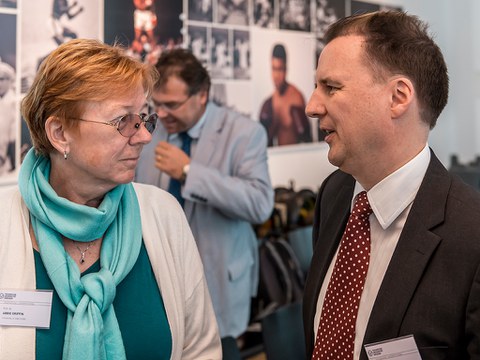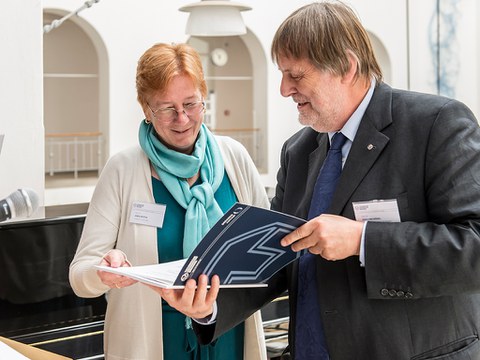Jul 24, 2014
Dresden Fellow: “How have the German students experienced me?”
Prof. Abbie Griffin visited TU Dresden within the Dresden Fellowship Programme from 8 June to 16 July, 2014. She was invited by the Chair of Entrepreneurship and Innovation held by Prof. Michael Schefczyk. Prof. Griffin holds the Royal L. Garff Presidential Chair in Marketing at the David Eccles School of Business at the University of Utah (USA), where she teaches business-to-business marketing and 1st-year core marketing classes to MBA students. Her research investigates means for measuring and improving the process of new product development. Prof. Griffin is among the most highly respected academics in the field of innovation management worldwide. We talked with her about her research and her experience in Dresden and at our university.
Welcome in Dresden and at the TU Dresden. Nice to meet you and thank you very much for the interview. Is it your first time in Germany and Dresden?
No, it is not my first time in Germany. I had been to a couple of conferences in Hamburg, one for Marketing Science and one for EIASM (European Institute for Advanced Studies in Management). Associated with the Marketing Science conference, we did a nine day 450 km bike trip along the Rhein. The Germans we met along this pathway were fabulous. Whenever we were trying to find out where we are, somebody came up and pointed us in the right direction. I think there were several parts of the path that were very tricky and we got lost at every single one.
My first trip to Germany was in the late 1990s. I was teaching the executive MBA program at the University of Illinois. We brought our executive MBA program to Germany for a week over spring break. We saw the BMW plant, the Volkswagen plant and several other facilities and companies. We visited Münster and many other places, including Leipzig. So I have been in Germany before, but never this far east. It is my first time in Dresden and it is such a lovely city.
What did you see in Dresden?
I saw the Frauenkirche, the Zwinger and I walked along the Elbe, sat in some beer gardens and had refreshments. I’ve been very fortunate because I’m here with the Entrepreneurship and Innovation Chair, Prof. Dr. Schefczyk. It was Whit-Monday when I arrived and we went to the Bastei. We took the ferry over that has no motor. It just steers with the current. It’s fascinating. Last Saturday we went to the Elbhangfest with one of the habilitation canditates and one of the PhD students. The group that I am visiting here has just been wonderful and they have treated me to outings. It’s been fabulous.
Is the research group your connection to the TU Dresden?
Yes, I give a global PhD seminar via the web every other fall. It’s called “Qualitative Methods for Social Science Research” and Ronny Reinhardt, a PhD student in the Entrepreneurship and Innovation Chair, took it last fall. He and Sebastian Gurtner, who is the habilitation person in the chair made the association. We have seen each other at a few conferences and they instigated me applying for the fellow program.
Do you think the Dresden Fellowship Program is a good invention?
Definitely it is a very good invention. I’m very honored and flattered to be included. The fellow program helps establish ongoing relationships. I was very impressed with the scholars that I was able to meet at the fellow lunch. Scientists from all over the world are part of the program and they are studying some interesting things. It was fascinating to see that every single school is represented in the fellows program. That shows that the university is trying to spread excellence across all different schools.
As a Dresden Senior Fellow you are part of lecture. Did you already give a lecture?
Yes, I was the keynote speaker at the business school yearly faculty colloquium, where I gave a seminar on my research on “Serial Innovators”. Furthermore I gave a two day seminar on qualitative research methods to the PhD students. 12 PhD students from across TU Dresden attended the seminar and I think they learned a lot. This morning I taught an undergrad class on understanding customers’ needs for new product development. And next week I will give another seminar to PhD students and faculty on “Publishing in US-Journals – How do you get published in US Journals?”
We have a number of things going on and I am tickled that they could schedule so many different things in the space of just four weeks.
How did you experience the German students?
I think the better question would be “How have the German students experienced me?”, because the American lecture style is more interactive. We were in a big tiered lecture hall and I made them come down and only use the first seven rows. Then very quickly we got into an example: I was standing up in front of the class, took off my shoe and held it up in front of the class. I asked them some questions about the shoe. After that I made them all take off a shoe, hold it up and look at each other’s shoes. And we talked about why there are so many different kinds of shoes and what kinds of tradeoffs people are making. This all related back to understanding customers’ needs. But clearly students are not used to undressing in class or taking off shoes. It woke them up. They were very attentive and I was very impressed with the class overall.
Are the needs of customers one of your research topic?
Yes, it was. I published a rather famous paper called “The Voice of the Customer”. It is the seventh most important paper ever published in field of marketing science. But it is also very practical and applied. That is very important in my research. I want to do research that is so rigorous that it can be published in good rigorous journals, but also that helps companies do new product development better.
Do you have other recent research projects?
Yes. I’m working on a big research project with two colleagues in Chicago, Illinois. We are looking at three different problems using the same data set. I’m looking at how firm outcomes impact on the way executives invest in different marketing tactics. Marketing investments can be in new products, in sales force, in advertising, in promotion and in a number of different types of vehicles. When a company invests in certain marketing tactics and they have certain outcomes, how does that impact their investments in the next decision making period?
In a related topic my research team is looking at how decision outcomes affect executive risk taking willingness. American firms are becoming more risk-averse. They like incremental new products rather than radical breakthrough products. They tend to invest more in incremental products than in radical new products. This is a problem, because incremental new products won’t help you grow. Only through revenue growth does the stock price of a company increase materially. The question we investigate is, why are firms investing so much in incremental new products and far less in radical innovations, although they know that radical innovation leads to higher stock prices?
Another research project with the same team considers the question of how firms invest in market research, how it does affect the firm performance and what the value of market information is.
You are working and researching in the field of innovation management? What is so fascinating about it?
This is my third career. I started my first career as a chemical engineer. I worked in a chemical plant and during my work I recognized that managing technology is very hard. Then I worked for the Polaroid Cooperation. We commercialized instant movies, a radical innovation. It was a terrible failure. Indeed people do want to see their movies and their videos immediately but it was the wrong technology. The right technology which shot the project down about nine month after commercialization was VHS technology. It was electronic, you could do it again and again. It was much less expensive. At the time when the first VHS player came to commercialization, the quality was horrible, but it very quickly increased. This is an example of a low cost, low quality innovation that ultimately just killed the high cost, high quality innovation. I got interested in how can you manage technology right and as part of my MBA, I studied management of technology. When I got my MBA I worked at Corning Glass Works and we had another technology commercialization radical breakthrough failure. At this point, I was not yet thirty, I had a quarter of a billion dollar failure at Polaroid, a quarter of a billion dollar failure at Corning, and I decided to study innovation management for the rest of my life. So I came to that set of research questions. I investigate about: How do you develop new products? How do you do it more effectively and efficiently? How can you manage breakthrough innovation? How do you make companies do that? Through my education and experience I understand the business side and the engineering side of research questions. That makes me uniquely capable in studying these much applied but very important problems for cooperation.
Are there plans to maintain the ongoing relationship to TU Dresden?
Yes, my being here is the beginning of a hopefully long term relationship between the University of Utah and TU Dresden. Next, Ronny Reinhardt will come to Utah for a year and he will be studying low cost innovation. I hope I can come back next summer. It would be fabulous to do another few weeks of working with student on projects. The number of really excellent graduate students in the Faculty of Business and Economics is amazing. I like to see them succeed.
Which advices would you give to future economics students and researchers?
Take as many short courses as you can across those that are offered in Europe as well as the global seminar series from the Institute for the Study of Business Markets that are offered out of America.
German academics are now writing far more in English than in German. They are all publishing in English language journals. So you need to get out there and polish your English up. Try to spend a minimum of 6 month in one of the English speaking countries and get exposed yourself into speaking English on a daily basis. And don’t skype home in German every day, skype home in English.
Thank you very much for the interview.
The Interview was conducted by Jana Höhnisch in July 2014.


